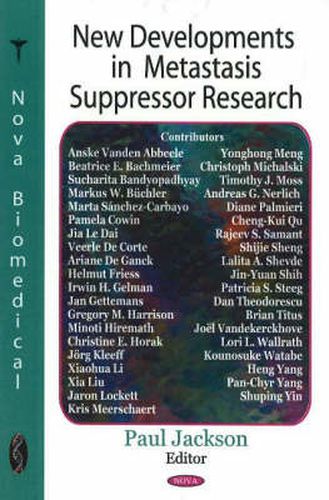Readings Newsletter
Become a Readings Member to make your shopping experience even easier.
Sign in or sign up for free!
You’re not far away from qualifying for FREE standard shipping within Australia
You’ve qualified for FREE standard shipping within Australia
The cart is loading…






The spread of cancer cells from their organ of origin to distant tissues is called metastasis. Cancer metastasis is the main cause of death from cancer, and in many cases is difficult to detect or treat. The process by which tumour cells become metastatic is complex and involves many stages, including detachment of cells from the main tumour mass, degradation of the surrounding extra-cellular matrix, invasion into nearby blood vessels, travel and survival through the circulatory system, attachment to a vessel wall, extra-vasation, degradation of the extra-cellular matrix into a distant tissue/organ, and the development of a novel blood supply. In order to accomplish this process, the cells acquire characteristics which are important for each stage. Recently, a class of genes known as metastasis suppressors’ has been the subject of intense investigation. For some metastasis suppressor genes, there is strong evidence from both in vitro and in vivo studies to demonstrate key roles in the metastatic process, for others data is much more limited, and their importance uncertain. In this book, chapters are devoted to providing up-to-date summaries of our understanding of individual metastasis suppressor genes. Each is written by a leading authority in the study of that gene. Topics covered include discussions on how each metastasis suppressor was discovered, the mechanisms underlying their loss of expression in tumours and tumour cell lines, their proposed molecular functions, and the consequences to a tumour cell of the loss of this function. This compilation aims to provide, in a single volume, comprehensive information that will be valuable to all scientists working in cancer research, to students needing to understand molecular events that regulate tumour progression and the acquisition of metastasis, and to clinicians who might wish to know more of the roles of potentially new markers for cancer diagnosis and prognosis.
$9.00 standard shipping within Australia
FREE standard shipping within Australia for orders over $100.00
Express & International shipping calculated at checkout
The spread of cancer cells from their organ of origin to distant tissues is called metastasis. Cancer metastasis is the main cause of death from cancer, and in many cases is difficult to detect or treat. The process by which tumour cells become metastatic is complex and involves many stages, including detachment of cells from the main tumour mass, degradation of the surrounding extra-cellular matrix, invasion into nearby blood vessels, travel and survival through the circulatory system, attachment to a vessel wall, extra-vasation, degradation of the extra-cellular matrix into a distant tissue/organ, and the development of a novel blood supply. In order to accomplish this process, the cells acquire characteristics which are important for each stage. Recently, a class of genes known as metastasis suppressors’ has been the subject of intense investigation. For some metastasis suppressor genes, there is strong evidence from both in vitro and in vivo studies to demonstrate key roles in the metastatic process, for others data is much more limited, and their importance uncertain. In this book, chapters are devoted to providing up-to-date summaries of our understanding of individual metastasis suppressor genes. Each is written by a leading authority in the study of that gene. Topics covered include discussions on how each metastasis suppressor was discovered, the mechanisms underlying their loss of expression in tumours and tumour cell lines, their proposed molecular functions, and the consequences to a tumour cell of the loss of this function. This compilation aims to provide, in a single volume, comprehensive information that will be valuable to all scientists working in cancer research, to students needing to understand molecular events that regulate tumour progression and the acquisition of metastasis, and to clinicians who might wish to know more of the roles of potentially new markers for cancer diagnosis and prognosis.